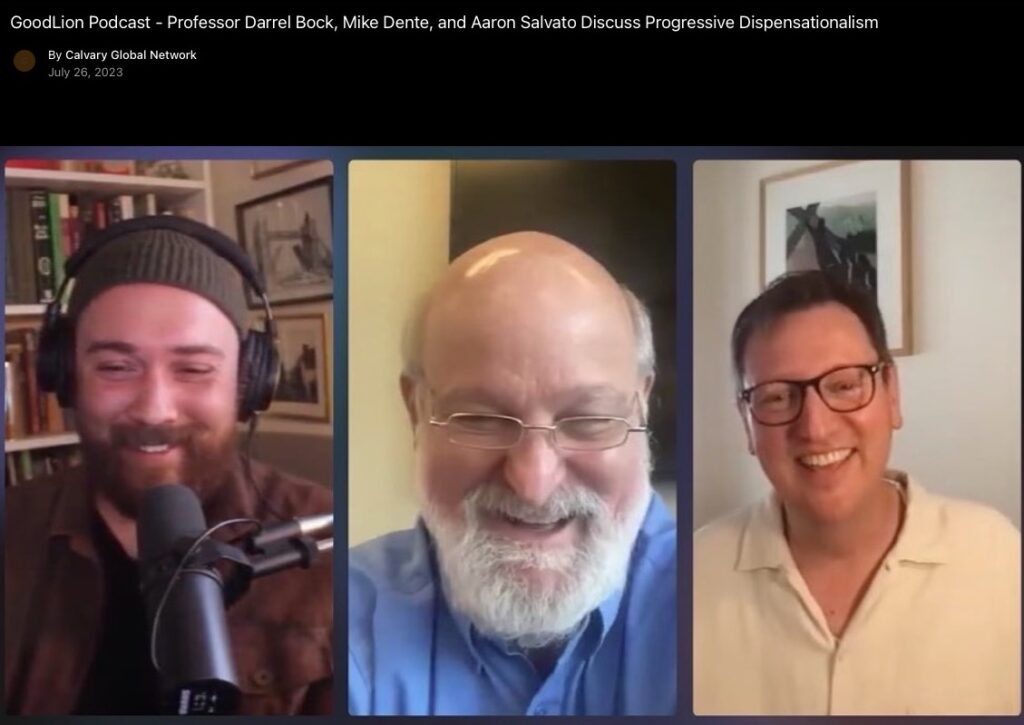
Biblical prophecy is quite a massive subject. When looking at all the various interpretations floating around in the evangelical world, one can feel a little like a Marvel Comics character voyaging through the multiverse. We in the Calvary Chapel movement have added to the conversation. We’ve followed Pastor Chuck Smith’s pre-millennial, pre-tribulation, dispensational approach made famous in the 1970s with Hal Lindsey’s book, The Late Great Planet Earth. This position has become a key figure in Pastor Chuck’s teaching and books, including Calvary Chapel Distinctives.
Although there’s quite a variety of Dispensational views within Calvary Chapel, we all tend to circle around the idea of the rapture, God’s particular plan for Israel, and the literal thousand-year reign of Jesus Christ.
Having come to the Lord in my twenties after a dramatic conversion experience, I grew up in the faith with Dispensationalism. My first years on the mission field were greatly encouraged through Chuck Smith’s 5000 series, with the constant reminder that the Lord is coming soon and an exhortation to prepare for the rapture. As an avid reader, it didn’t take long before I began to read anything on the subject I could get my hands on.
During this time, I ran into the book Things to Come: A Study in Biblical Eschatology by Dwight Pentecost. This theological textbook draws out the covenantal lines of Dispensationalism while looking at some serious opposing views. This book became an excellent source for me; though some of its terms from the 1960-70s are no longer being used, the theology remains current.
Why I Interviewed Dr. Darrell Bock
In more recent years, another form has grown in popularity in our ranks and is called Progressive Dispensationalism. When I first heard the term, I was intrigued. But what is it? I found it hard to find a good succinct definition. This led me to ask our Content Strategy Director, Aaron Salvato, if I could do an article on the topic to help others who might also be looking for some clues. He suggested I begin with doing a podcast interview with Dr. Darrell Bock from Dallas Theological Seminary.
I followed Aaron’s advice and then emailed Dr. Bock, who responded immediately and positively. He agreed to an interview on The GoodLion Podcast, which Aaron and I have completed!
My first thought was to present the discussion here in an article form, but the more I dug, the more I realized the subject is more book-size, and here at calvarychapel.com, we like to keep our articles to 1000-1500 words. So I’d like to briefly answer the question that set me on this quest and end with a few takeaways, while encouraging our readers to watch or listen to our upcoming podcast.
Editor Note: This audio episode of the GoodLion podcast won’t be available until next season, but as a blessing to our readership at CalvaryChapel.com, we have provided a full video version you can watch by clicking the image link below!
What’s Dispensationalism?
Let’s begin at the beginning. What is Dispensationalism? It’s a movement in biblical theology and eschatology that sees God’s action in the world moving in “dispensations” toward the consummation of all things. What is a dispensation? Here’s how Darrell Bock and Craig Blaising explain it:
“The word dispensation refers to a particular arrangement by which God regulates the way human beings relate to Him. Dispensationalism believes that God has planned a succession of different dispensations throughout history, both past, present, and future. Furthermore, dispensationalists believe that these dispensations are revealed in Scripture, in both biblical history and prophecy.
Understanding these dispensations, these different relationships God has had and will have with humanity is crucial for comprehending the teaching and message of the Bible.”[1]
Another way to look at dispensationalism is to see it as concerning the various covenants in the Bible. For example, the Covenant with Abraham showed, among other things, God’s choice of a man who, through His blessing, became a Nation (Israel) through which the entire world would be blessed. Later, God covenanted with Israel through Moses introducing the Law, showing them the way to life and the terrible consequences of abandoning Him.
In the same way, God’s Covenant with David showed that He would raise a King from among his sons through which His blessing would flow. Then the New Covenant, expressed in Jeremiah 31, spoke of a coming time when Israel would know God personally and the law would be written on their heart.
Traditional Dispensationalism tends to see the separations in set periods that don’t overlap. This is why they’ve been accused of promoting a dualistic or discontinuous theology, as if to say there are two disconnected peoples of God under two parallel covenants, implying, in the worst cases, that they both lead to heaven.
Progressive Dispensationalism has looked at these problems, among others, and sought to address them.
What Makes Progressive Dispensationalism “Progressive?”
How is it progressive? It’s not a politically progressive movement, nor is it a reference to a sort of progress over and above what came before. Instead, the term “progressive” speaks to how God moves in the revelation of Himself to mankind, crescendoing in the physical return of Jesus to earth and beginning in His thousand-year reign. Rather than adopt a hard stance on separating dispensations, Progressive Dispensationalism moves more fluidly, permitting overlap.
In the words of Dr. Bock, “Progressive Dispensationalism is not so much a movement demanding the choice “either-or” but one that asks why not “both-and”?”
Again, Blaising and Bock state, “Progressive dispensationalists understand the dispensations not simply as different arrangements between God and humankind, but as successive arrangements in the progressive revelation and accomplishment of redemption.”[2]
This isn’t to say that it adopts an everything-goes mentality. Since its beginning with Bock and Blaising in the late seventies with Dallas Theological Seminary, and then later in the mid-eighties while taking shape on a more national level with theologians like Dr. Gerry Breshears at Western Seminary, it’s been steeped in deep theological reflection. They work within a Historical-Grammatical interpretation but also delve into the Literary-Theological method, all while not ignoring the Canonical-Systematic hermeneutic nor ignoring the Typological-Prophetic reading.
Regarding hermeneutics, they summarise their goals as follows:
“Scripture constructs a worldview. The Word is not just about a random series of events, facts, doctrines, or propositions. Nor is it even a picture of different groups all with equal access to God. There is no relativism in Scripture about how one enters into relationship with God. Rather, the Bible speaks to relationships, whether healthy or crippled, and calls the reader to enter into blessing on God’s terms through Jesus or else be left on the outside, subject to the story’s divine outworking.
“Ultimately, Scripture is about God’s promise realized in Jesus. Everyone is accountable to Him who is our Creator. In the message of Scripture, we find how God created and entered the world of humanity. God tells us just how He did it, does it, and plans to do it. He invites us to join Him in the journey. The task of hermeneutics is to listen carefully and humbly for His voice, so we might walk with Him.”[3]
Why You Might Want to Listen to the Interview with Dr. Darrell Bock
The questions I’ve tried to answer may lead to more questions, as they did for me. This is why I’ve wanted to quote only one source besides the podcast. Progressive Dispensationalism by Blaising and Bock set the theological foundation of the movement in a well-rounded presentation. Ultimately, it isn’t easy to present succinctly because it requires enough time to consider the points it touches and how it relates to other theological systems. But I’d encourage anyone interested to jump in.
Whether you finish by being convinced or not, you’ll immerse yourself in Scripture through the process, which will reap many spiritual rewards.
My Biggest Takeaways
That quest to know God more and gain insight into His Word is probably one of my biggest takeaways from this excursion. Talking with Dr. Bock and, more recently, with Dr. Breshears, I’ve been encouraged to do the hard theological and exegetical work. It can be tempting to shy away from these subjects, to write them off as squabbles among the intelligentsia that have no importance to the everyday world of the Church.
I’d take issue with that point of view, though I held it in the past.
We’re all theologians; in some ways, even an atheist is a theologian who espouses a vision of God in their belief system, conversations, and daily life. Being a theologian is inescapable as we’ve been created in His image.
The question is, what kind of theologian do we want to be? One characteristic that separates an excellent theologian from others is the question of love. If we love God and seek to know Him more, we’ll grow in humility as our learning becomes a form of worship.
This is what I’ve observed speaking to these and other academic theologians who’ve dedicated their lives not only to know God more but to serve the greater Church by helping us in our walk.
References
[1] Craig A. Blaising and Darrell L. Bock, Progressive Dispensationalism (Grand Rapids, MI: Baker Publishing Group, 1993), Kindle Edition 14.
[2] Blaising and Bock, Progressive Dispensationalism, 48.
[3] Blaising and Bock, Progressive Dispensationalism, 105.











